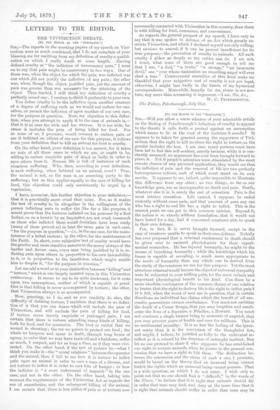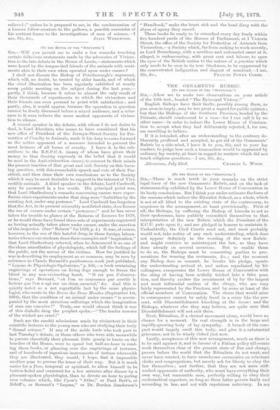(To TRH EDITOR OF THE "SPECTATOR.'] Sut,—Will you allow a
warm admirer of your admirable article on the Bishop of Peterborough's definition of cruelty to append to the thanks it calls forth, a protest against an assumption which seems to lie at the root of the doctrine it assails ? It appears to be taken for granted among the supporters of Vivi- section that the right to kill involves the right to torture, as the greater includes the less. I am sure many persons must have been led to feel this self-evident, merely because, while it is con- stantly assumed, no argument has over been brought forward to prove it. Yet if people's attention were stimulated by the moat remote chance of any personal application, they would see that the infliction of pain and the removal of life are two perfectly heterogeneous actions, each of which must stand on its own merits. It appears to me, indeed, quite impossible to illustrate this difference from any other ; no two things, as far as our knowledge goes, are as incomparable as death and pain. Death, whatever else it is, is surely the end of sensation. Pain is the most intense sensation. Life cannot, I suppose, be ended violently without some pain, and that amount of pain any one who has a right to end life has a right to inflict. This is the nearest point we can get to this common opinion. Beyond it, the notion is so utterly without foundation, that it would not have lasted for a day, had it concerned creatures able to speak in their own defence.
For, in fact, It is never brought forward, except in the case of creatures unable to speak in their own defence. Nobody has ever proposed that a criminal condemned to death should be given over to eminent physiologists for their experi- mental researches. He has injured humanity, he might be the means of benefiting humanity ; while the knowledge which his frame is capable of revealing, is much more appropriate to the needs of humanity than any which can be derived from the study of the creatures we use for this purpose. Yet the most atrocious criminal would become the object of universal sympathy were he subjected to even trifling pain, for the most certain and important physiological benefit to his kind. Can there be a more absolute confutation of the common theory of our relation to brutes that the right to destroy life is the right to inflict pain P It is felt, when the worst of men are in question, that in certain directions an individual has claims which the benefit of all sue. cessive generations cannot overbalance. You must not embitter the death of a Crosar Borgia, that you may lengthen and ameli- orate the lives of a Socrates, a F&Alon, a Howard. You must not condemn a single human being to moments of anguish, that you may procure years of health and ease for millions. This is no sentimental morality. It is no less the feeling of the ignor- ant many than it is the conviction of the thoughtful few, and might, I believe, be justified as fully to the cultivated in- tellect as it is echoed by the response of untaught instinct. But let no one pretend to share it who supposes he has established our right to torture animals, when he points to the general con- cession that wo have a right to kill them. The distinction be- tween the concession and the claim of such a one, I presume, would be based on the theory thai an immoral being cannot forfeit the rights which an unmoral being cannot possess. That is a wide question, on which I do not enter. I wish only to point out that no one should find it "difficult," in the words of the Times, "to declare that it is right that animals should die in order that man may feed, and deny at the same time that it is right that animals should suffer in order that man may be
relieved ;" unless he is prepared to see, in the condemnation of a human fellow-creature to the gallows, a possible surrender of his sentient frame to the investigations of men of science.—I



































 Previous page
Previous page